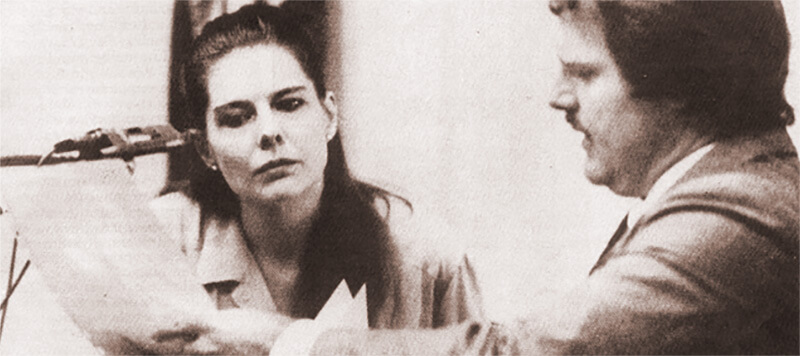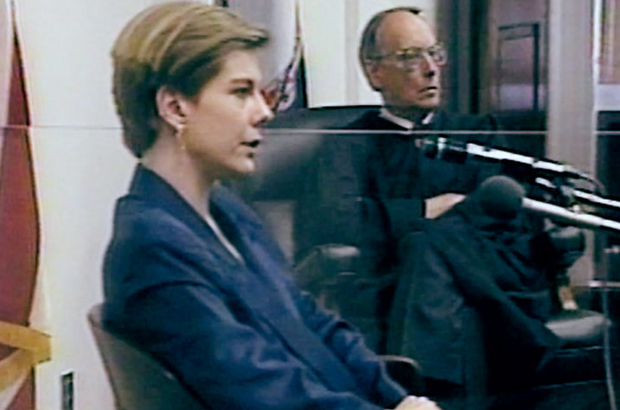NICK FERRIS examines Karin Steinberger’s documentary that re-investigates the 1985 college romance that lead to murder.
In 1985, Elizabeth Haysom’s testimony in a trial concerning the brutal double-murder of her parents captivated the American public, and convinced a court that she was only guilty of second-degree murder. While it was known that Elizabeth wanted her parents dead, her boyfriend Jens Soering was charged of committing the crime. A lack of hard evidence implicating Jens and the apparent discrimination against the hyper-intelligent German, in favour of the beautiful and local Elizabeth, has led director Karin Steinberger to question the court’s verdict. The Promise is a documentary that exhibits the skill of Steinberger’s craft, and the importance of investigative journalism.
The case remains perplexing, as Elizabeth’s motives for murder are never completely clear. She was raised in Europe and studied at the prestigious Wycombe Abbey outside London, where she developed a flair for academia alongside a heroin addiction and worsening mental instability. Devastated by an Oxbridge rejection, she found love at the University of Virginia, falling for Jens, the impressionable son of a German diplomat. She expressed deep hatred for her parents in letters to him and talked of using ‘black magic’ to kill them. The Haysoms’ death triggered a murder mystery filled with intriguing details: a rental car covered in blood, a drug transaction, cinema tickets as alibis, and a flight across the Atlantic to live in Europe under false identities. When the law caught up with them, they both claimed that Jens was the murderer. Yet after his 1990 extradition from Germany, he confirmed that this was a lie he told out of love for Elizabeth; he believed his diplomatic status would give him a more lenient sentence back home in Germany. Despite there being only the slightest piece of incriminating hard evidence against Jens (a fuzzy sock-print in blood of a similar size to his foot), he was found guilty and charged with two life sentences.

The Promise tells its story entirely through the use of archive courtroom footage and present-day interviews with both Jens and a band of local politicians and attorneys who are still fighting his cause. The lack of a narrator and a clear narrative thread cleverly places the viewers in the investigator’s role. At the start of the film, the audience are filled with dread and confusion as two horrifically mutilated bodies appear on screen. The mysterious and striking Elizabeth, seen in the footage of her courtroom appearances, adds further uncertainty, which powerfully emulates the 1985 general public’s fascination. Footage of the present day pasty-looking Jens in a maximum security prison asking strange questions instantly raises alarm bells. It is only as the film progresses that he gradually wins the viewers over with his story and the apparent injustice he has faced. Steinberger establishes a pretence of objectivity in the viewer, as though they are working independently on the case.

Towards the end, viewers may detect hints of journalistic bias as the film becomes a calling card for Jens’ release. So sympathetic is his portrayal that his undeniable culpability in forging documents to flee the country with Elizabeth is seemingly brushed over. He remains guilty of perverting the course of justice by taking the blame for what he creepily termed ‘our little nasty’. Steinberger can be a little heavy-handed in pitting Elizabeth against Jens as a battle of good against evil. In the closing credits, Elizabeth’s refusal to offer the filmmakers an interview is dramatically spun as the final incriminating nail in the coffin. That being said, the film makes clear that the original trials were flawed; with everyone from Angela Merkel to Elizabeth’s own brother questioning Jens’ conviction, a re-examination of the case is due. The publicity that Steinberger’s film generates for the 30-year-old case may prove to be invaluable to that cause.

A kind of grotesque Romanticism pervades much of the story, and is encapsulated by Elizabeth labelling herself Lady Macbeth when explaining how she convinced Jens to do her bidding. The Promise is also wonderfully Hollywood in many respects, with a femme fatale reminiscent of Double Indemnity or The Maltese Falcon, charming everyone with her beauty and a cut-glass accent to cause chaos all around. The prosecutors’ ignorance of what actually happened prior to her arrest, and her willingness to reveal the story, allowed Elizabeth to offer an Agatha Christie-esque revelation of the extraordinary events of her life, her relationship with Jens, and the murder. The fact that much of her story was supposedly a lie only adds to its sensationalism. Jay Hawkins’ I Put a Spell On You is aptly chosen by Steinberger as the theme music, and mirrors the haunting nature of a case that remains ambiguous to this day. The lasting impression of the film is neither of the courtroom procedure nor Jens’ injustice, but of the hazy 1980s footage of a beautiful ice queen-like figure that was Elizabeth, holding the whole court in complete rapture.
‘The Promise’ was released on 13th January at the Bertha DocHouse. More information here.





